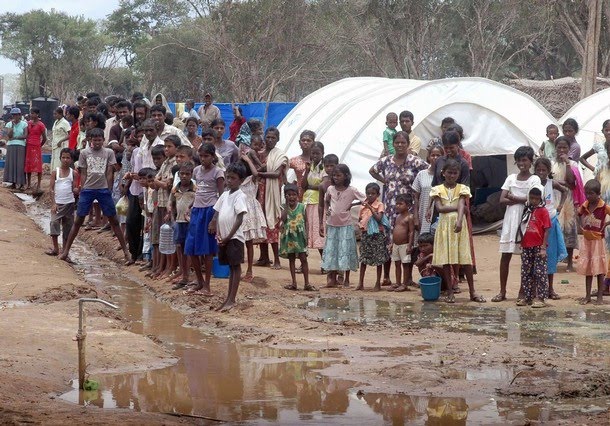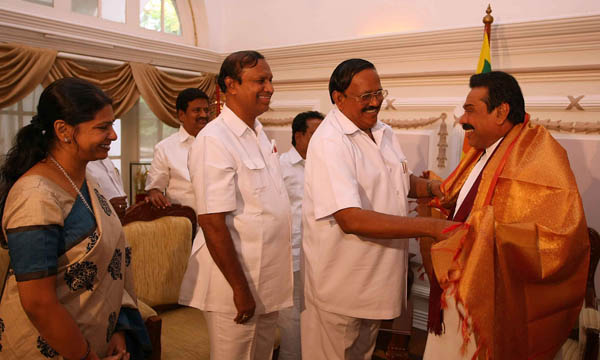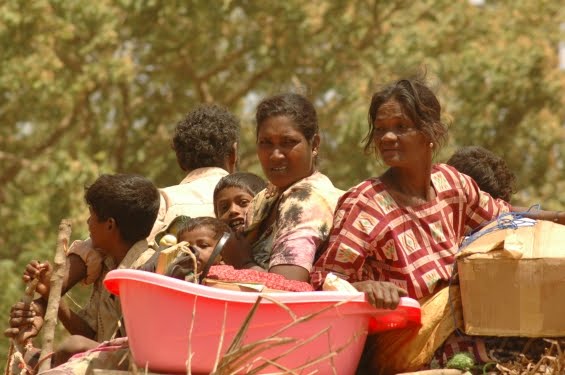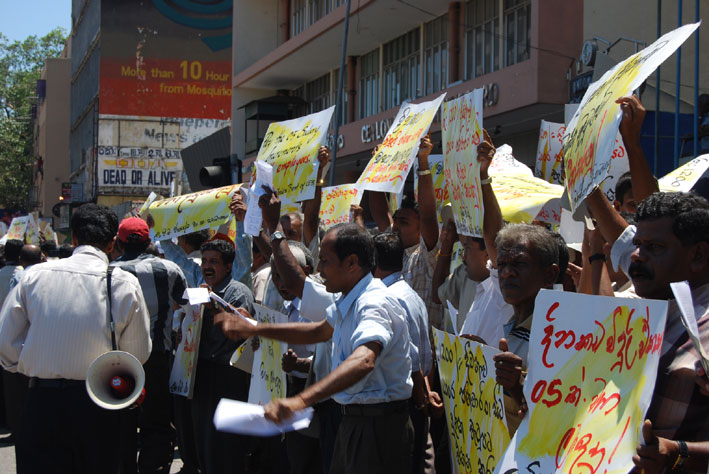%2Bstand%2Bnear%2Btemporary%2Bstructures%2Bin%2Bthe%2BArunachalam%2Bcamp.jpg)
Updates received by Groundviews in the evening today from the field suggest that heavy rain, as it did in August, is again causing havoc in Menik Farm. We were able to confirm heavy precipitation in Vavuniya, but other points noted in these updates are unverified and published here for others in the area, or in the know, to confirm or counter. All times are +5.30GMT.
9.38pm
A reported 1,500 IDPs in Zone 6 are giving the Zone Commander a hard time over leaking shelters.
9.41pm
There was heavy rain at Menik Farm and expect that continuing. Most shelters already damaged and due to this rain cannot stay anymore. I think people try to go out of the camps. Tomorrow only can get more details.
10.01pm
People agitated at Zonal Commander in Zone 6b because shelters are damaged for 1,500 people. World Vision is sending 500 tarpaulins down and 3 busses are ready for evacuation of extremely vulnerable individuals if required. Seems it will get under control.
© Groundviews
Wednesday, October 14, 2009
Breaking news: Flooding and unrest again at Menik Farm?
Wednesday, October 14, 2009
Sri Lanka post-war prospects scouted by US firms

American firms are scouting for business opportunities in post-war Sri Lanka in anticipation of accelerated economic growth, officials said.
Senior executives, mainly from top US companies in India, are in Colombo for talks with Sri Lankan firms and government agencies.
US investments could help rebuild the war-ravaged economy and contribute to lasting peace, Michael Delaney, assistant US Trade Representative for South Asia, told a conference on investment and business opportunities in post-conflict Sri Lanka.
"You can help bring employment and new opportunities to Sri Lankans affected by war," he told Sri Lankan and US representatives from both the public and private sectors.
"Employment generation is a key factor in fostering national reconciliation."
Among the American firms taking part in the conference were General Electric, Ford Motors, Marriott International, Rockwell Automation, Coca-Cola, 3M, Caterpillar, UPS, CH2M Hill, and Levi Strauss
The companies are looking at infrastructure development, energy, tourism, information technology, business process outsourcing, healthcare, education, manufacturing, food processing, trade financing, and logistics.
The visit of officials from US firms, organised by the American Chamber of Commerce in India, follows the end of the island's 30-year war when government forces defeated the Tamil Tiger separatists in May.
"Thanks to the peace dividend there's going to be a lot of growth in this country," Pradeep David, regional manager, South India of Rockwell Automation, told LBO in an interview.
He said he is looking for new markets for the company's industrial automation products designed to make manufacturing more efficient.
"For instance in the rubber industry, we can help improve productivity of tire building machines. Also, we have control system for use in airports and metros."
The US business team is scheduled to visit the eastern Trincomalee town on Wednesday.
The conference on public-private partnerships is being held on the sidelines of talks between the US and Sri Lankan governments on a free trade and investment deal between the two countries.
David Westerman, regional manager, Asia Pacific, Ford Export & Growth Operations, said he wants to identify a new distributor for Ford in Sri Lanka and understand how local import tax and duty structures impact import versus assembly.
"But there are no immediate plans for assembly operations here, although we will look at the advantages of manufacturing during my visit," Westerman said in an interview.
"We see a lot of positive things happening here in the next six months," he said. "With the end of the war we think there are going to be tremendous opportunities here, with a lot of growth and investment. Our desire is to get in early."
The total present value of US investments in Sri Lanka remains relatively small - about 250-300 million dollars.
The US is the largest single market for Sri Lankan exports. Sri Lanka exports about two billion dollars worth of goods to the US each year, mainly apparel and textile products.
Imports from the US are about 200-300 million dollars worth of products.
© Lanka Business Online
Related links:
Business and investor partnerships between Sri Lanka, US strengthened - Daily News
US, Lanka biz looks to rise above politics - The Bottom Line
Wednesday, October 14, 2009
Tamil Nadu delegation expresses satisfaction to President

The visiting delegation of MP’s from the state of Tamil Nadu in India met with President Mahinda Rajapaksa yesterday evening and expressed their satisfaction over the government’s steps to assist the internally displaced.
A statement released by the President’s office noted that the MPs had been most encouraged by the measures taken by the Sri Lankan government and had expressed their sentiments during the meeting with the President and Senior Presidential Advisor Basil Rajapaksa.
They had thanked the President for giving them the opportunity to see the state of the internally displaced welfare camps for themselves and ascertain the situation. The delegation and also expressed concern over the resettlement of displaced before the oncoming monsoon season and had been assured by the President that a large number of people would be resettled in the coming days. The Tamil Nadu MPs also maintained that they were happy with the government steps to provide shelter during the monsoon.
Tamil Nadu delegation expresses satisfaction to President
The visiting delegation of MP’s from the state of Tamil Nadu in India met with President Mahinda Rajapaksa yesterday evening and expressed their satisfaction over the government’s steps to assist the internally displaced.
A statement released by the President’s office noted that the MPs had been most encouraged by the measures taken by the Sri Lankan government and had expressed their sentiments during the meeting with the President and Senior Presidential Advisor Basil Rajapaksa.
They had thanked the President for giving them the opportunity to see the state of the internally displaced welfare camps for themselves and ascertain the situation. The delegation and also expressed concern over the resettlement of displaced before the oncoming monsoon season and had been assured by the President that a large number of people would be resettled in the coming days. The Tamil Nadu MPs also maintained that they were happy with the government steps to provide shelter during the monsoon.
The delegation, which arrived on Friday is scheduled to leave today following a meeting with Foreign Minister Rohitha Bogollagama.
© The Bottom Line
Wednesday, October 14, 2009
The long suffering of Tamils in Sri Lanka

Refugee in Paris this summer, Sriramanan Ratnasingam A former head of the secretariat of the north-west for Human Rights (Nesohr) at Sri Lanka Is not a witness as others in the war between the Colombo government and the separatist rebels of the Liberation Tigers of Tamil Eelam (LTTE). Wounded by shrapnel when he was brought in April, on the forehead with an ambulance and a camera, he proposes, we are receiving, to show his wounds, traces of the conflict that has seen, on may , the defeat of the LTTE after thirty years of fighting.
It also offers on the situation of the country a new vision, that escapes both the government propaganda that the LTTE, on the serious obstacles still facing Sri Lanka. The government's military victory over the LTTE has in fact not ended the conflict. He said the country remains under siege. The military remains pervasive and freedoms are repressed by a militaristic and autocratic regime.
"My 12 year old daughter died in late April because of phosphorus bombs that the military in Colombo said they had never used while we were evacuated to Vavuniya (north), says he, and one of my son, age 7, was evacuated to a hospital ship in the Red Cross after being hit by shrapnel ". The death of his daughter and the intervention of a relationship to the Vavuniya town hall will allow it to avoid filtration camps where the army holds the hunt for ex-members of the LTTE among the displaced. "In these transit camps, they put women and men in long lines separated and forced to strip off in front of everyone and they keep for weeks for questioning."
Precarious living conditions
Six months after the defeat of the Tamil Tigers, who host the camps in Vavuniya nearly 300 000 displaced Tamils in the fighting, were not emptied. Their living conditions are precarious as NGOs denounce the restrictions imposed on their work by the military.
In late September, the camp guards Manik Farm At Vavunyia, opened fire on a group of displaced persons who wished to join their families on a nearby site. The 7 and 9 October, about the deteriorating humanitarian situation in these camps, Great Britain and the United States has again called for the government in Colombo "guarantee the free movement of displaced persons".
To bury his daughter, as to leave Vavuniya with the rest of his family, Sriramanan Ratnasingam had to pay the government soldiers. "To reach Colombo, people paid 80 000 rupees each dam and for the papers, my mother, who lives in Germany, had to pay between 5 000 and 6 000 Euros ."
If his organization Nesohr, born in 2004 after the signing of the peace process initiated in 2002 by Norwegians between the LTTE and Colombo, would theoretically bring the voice of the Tamil population, its relationship with the Tigers were not simple. "I am a Tamil but I also had problems with them, he says , we encountered in LTTE recruitment of children and the conditions of detention of prisoners and we tried to fight against the extortion of the Tamil people. "
UNICEF, with whom he worked to remove children from the ranks of the LTTE, in turn, help his family to leave the country after him. "The authorities could have taken hostage my children and my wife make me pay for my flight".
© Le Monde
Wednesday, October 14, 2009
Trade union action on salary issue: CWBTUC warns

By Hemanthi Guruge - The Combined Water Board Trade Unions Committee (CWBTUC) affiliated to the JVP threatened that trade union action would be taken as the government had failed to increase the salaries of the workers for the past three years, the Convener of the Union Upali Ratnayaka said.
He told the Daily Mirror that they did not get their salary increase since 2006 and they would be compelled to go on an islandwide strike if the government fails to increase their salaries within the month.
The salaries of water board employees are increased once in three years and the last increment was given in 2006. The next salary hike was to be given this year, but so far the management had failed to take any action in this regard.
“We demonstrated in front of the Deputy General Manager’s office (DGM) in Kandy, followed by similar protests in front of the DGM offices in Anuradhapura and Matara,” he said.
Minister of Water Supply and Drainage A.L.M. Athaulla said there would be no pay hike for the Water Board employees for the year 2009. The reasons the minister gave was that it’s up to the cabinet to decide on this matter, the convener said.
© Daily Mirror
Wednesday, October 14, 2009
Don't ignore militarised sexual violence

Malathi de Alwis - US secretary of state, Hillary Clinton, caused a furore in Sri Lanka recently when she noted that rape had been used as a tactic of war in "Bosnia, Burma, Sri Lanka, and elsewhere" while speaking on the unanimous adoption of the US-sponsored UN security council resolution 1888, which recognises sexual violence as exacerbating situations of armed conflict and impeding the restoration of international peace and security. The government of Sri Lanka immediately lodged a protest with the US embassy resulting in the state department issuing a "clarification" acknowledging that "in the most recent phase of the conflict, from 2006-2009 … we have not received reports that rape and sexual violence were used as tools of war". The government of Sri Lanka decided to accept this "gesture of goodwill" and to not "pursue this distasteful issue any further", while carefully ignoring additional inclusions in the statement that "numerous cases of rape and sexual violence in Sri Lanka, particularly acts committed against women held in detention by the government", have been detailed in the past.
Cynics might laugh it off as a storm in a tea cup – but this furore and its subsequent "resolution" raises a series of troubling issues. Undoubtedly, there is no evidence that the Sri Lankan armed forces have systematically used rape as a tactic of war – when soldiers rape en masse in order to terrorise, violate and humiliate the "other". Reports of sexual violence by members of the armed forces have also declined, this past decade. However, this does not negate the various forms of sexualised brutality which have been perpetrated on countless Tamil women and some Muslim women, by members of the Sri Lankan armed forces and police as well as the Indian Peace Keeping Forces, during this three-decade long civil war – Krishanthy Kumaraswamy, Murugesapillai Koneswary, Ida Carmelita and Rajini Velauthapillai head a long list of names of raped and murdered Tamil women publicised and protested by Sri Lankan feminists. Local activists in the north and east can match every rape that is reported with 10 others which have not been reported (if they live to tell the tale) out of shame or fear, or both. It is a "distasteful issue" that the Sri Lankan government, the armed forces, indeed all of us Sri Lankans, need to confront and condemn.
Militarised sexual violence in Sri Lanka has not been restricted to women from ethnic minorities or other marginalised groups, such as working class, lower caste or transgendered women. Innumerable sexual atrocities were committed against Sinhala women during two Sinhala youth insurrections in the south of the island and there are reports of soldiers beating and/or sexually abusing their wives, their lovers and sex workers during rest and recreation leave. While acknowledging the unrelenting struggle waged by a handful of feminists within the UN, as well as a myriad international feminist organisations and lobby groups to push the UN, to even condemn the resort to sexual violence in contexts of conflict, it is also important to recognise that such piecemeal resolutions – 1325, 1820 and now 1888 – do not adequately address the fact that militarism is inherently violent, patriarchal and masculinist, and intrinsic to the expansion of capitalism and imperialism. In other words, it is a legitimised form of structural violence that pervades our everyday, is dependent on particular gendered notions and practices and is not merely restricted to wars and conflicts. This is exemplified in the 1991 Tailhook scandal, where more than 80 US naval women officers were sexually harassed by US naval pilots while attending a two-day symposium at a Las Vegas hotel.
Addressing the militarisation and institutionalisation of sexual violence would enable a much broader and more comprehensive critique of state/counter-state paramilitaries while dis-enabling hypocritical stances adopted by the likes of Hillary Clinton, who is quick to point the finger elsewhere despite the US military being one of the worst perpetrators of sexual violence both within and without the US. It is time the US as well as the Sri Lankan government's acknowledge the culpability of its respective militaries, the "securing of peace" notwithstanding.
© Guardian
This site is best viewed with firefox

Search
Is this evidence of 'war crimes' in Sri Lanka?
Archive
- ► 2010 (1312)
- ► 2011 (687)
Links
- Reporters Sans Frontières
- Media Legal Defence Initiative
- International Press Institute
- International News Safety Institute
- International Media Support
- International Freedom of Expression eXchange
- International Federation of Journalists
- Committee to Protect Journalists
- Asian Human Rights Commission
- Amnesty International















